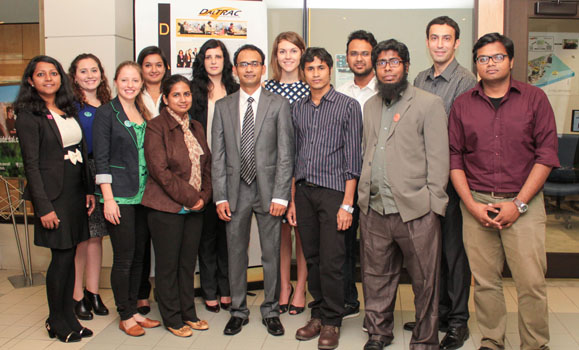Throughout the history of transportation, cities have grown and expanded based on the needs of the population.
Halifax, for example, started off as a British military base in 1749 and has since evolved to encompass everything from residential blocks to university campuses. The growth of all cities, provinces and countries is dependent on the methods and patterns of transportation, all of which are based on some common questions: where do people live? Where do they need to go?
As a city grows, answers to these questions become scattershot: itās no wonder then that when you look at Halifax from a birdās eye view you see a convoluted pattern of streets criss-crossing every which way.
Luckily, as members of the population we do not have to personally understand all the ins and outs of transportation. Instead, we have research units such as DalTRAC to help us make sense of it all.
DalTRAC (Dalhousie Transportation Collaboratory) focuses on the collection an analysis of transportation data to determine trends and action programs. Over the past few years, DalTRAC has been about gathering data on transportation in Nova Scotia, something theyāre looking to expand on with provincial support. Last month, DalTRAC held an event with the Nova Scotia Department of Energy to announce the expansion of its across the province.

Ashan Habib, an assistant professor in Dalās School of Planning and Department of Civil & Resource Engineering, announced that āthe biggest next future plan [of DalTRAC] would like to do [is a] NovaTRAC survey.ā Surveys like NovaTRAC would help government better understand the transportation needs of Nova Scotians. The data collected by Dr. Habib and his students will be readily available, helping the government make decisions about transportation upgrades and improvements.
The Honourable Andrew Younger, Minister of Energy was on hand at the October 17 event to celebrate the partnership, which Dr. Habib describes as āTranslating [DalTRACās] research into action.ā The campaign will promote positive behavioural change and safer sharing of the road for all road users in Nova Scotia. It aims to educate about the basic rules of the road, and to promote higher awareness based around the most dangerous times of the year. (Statistically, most accidents happen between November and January.)
DalTRAC initiated this campaign after extensive community consultation and researching the pilipiliĀž» of more than 70 similar campaigns worldwide. The campaign is community based and focuses on targeting the most vulnerable groups of the population, youth and students. As such, it will use social media to advertise safe transportation habits whether you are a pedestrian, a motorist or a cyclist. In particular, it encourages people to use a āthumbs upā safety approach, where individuals witnessing safe road usage should respond with a kind and welcome āthumbs upā gesture. Ā
Find out more about this campaign on Facebook under .

